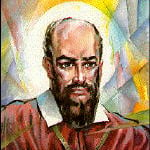Pope Leo XIV – Inaugural Mass Homily
Elected on May 8, 2025, as the 267th successor of St. Peter, Pope Leo XIV’...

St. Francis de Sales was born near what is now Annecy, France in 1567, shortly after the conclusion of the Council of Trent. He studied the law, but abandoning the prospect of a brilliant career in that field, was ordained to the priesthood in 1593, despite the opposition of his father. His first mission was to re-evangelize the people of his home district which was only 21 miles south of Geneva, the center of Calvinism. Always in danger of his life from hostile Calvinists, he preached so effectively that after four years, most of the people had returned to the Church. In his battle against Calvinism he was driven by love rather than a desire to win: “whoever wants to preach effectively must preach with love.” A Calvinist minister gave him the following tribute: “if we honored anyone as a saint, I know of no-one since the days of the Apostles more worthy of it than this man.” St. Francis was appointed bishop of Geneva, the city of John Calvin, in 1602, and spent the rest of his life reforming and reorganizing that diocese and in caring for the souls of his people. He became the spiritual director of St. Jane de Chantal with whom he founded the nuns of the Visitation in 1610. In his most famous writings, the Introduction to the Devout Life (1609) and the Treatise on the Love of God (1616), St Francis taught that we can all attain a devout and spiritual life, whatever our position in society, that true holiness is not reserved for monks and hermits alone. His wrote that “religious devotion does not destroy: it perfects” every state in life. In fact his spiritual counsel is dedicated to making people more holy by making them more truly themselves. In this he anticipates the Second Vatican Council’s teaching that the call to holiness is truly Universal (Lumen Gentium, chapter 4). St. Francis de Sales died at Lyons, France on December 28, 1622, and was buried at Annecy on January 24 which is the day each year that the Church honors him in her liturgy. He was canonized in 1665 and declared a Doctor of the Church by Pope Pius IX in 1877. Because of the many tracts he published to explain and defend the Catholic faith, Pope Pius XI proclaimed him Patron of the Catholic Press in 1923. Biography by Dr. Italy